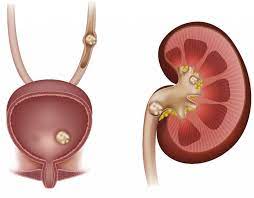


Answer: The treatment of urinary stone/kidney stone (kidney stone) depends on the size of the stone and where it is located. Most of the people (80%) have 6 mm or smaller stones. l Stones 6 mm or smaller pass on their own or with medication in most (80%) people. Stones 10 mm or larger are less likely to pass on their own, so such a small stone that does not come out by itself (stuck stone) is removed by operation.
Stones located in the lower part of the kidney tube (ureter), bladder, or urine tube (urethra) are more likely to pass on their own than stones located in the upper part of the kidney or ureter.
Answer:
Unbearable pain in the side of the back or lower abdomen (severe flank pain)
Pain that keeps increasing, decreasing, and coming again and again.
Vomiting or the urge to vomit.
Burning sensation while urinating.
Retention of urine
Blood in urine
Answer: The main function of the kidney is to filter the blood, remove the impurities of the blood (useless salts) from the body in the form of urine, and maintain the balance of water and useful salts in the body.
Whenever the ratio of salts and water in the urine exceeds a certain amount (solubility coefficient), the salts begin to accumulate and form stones.
Answer:
Drink less water
Excess of animal protein and salt in the diet.
Lack of exercise in routine.
Having a family history of kidney stones.
Having high blood pressure
Being obese
Answer: You should consult a trained Urologist (Qualified Urologist). The urologist will do a physical examination, note down the history of symptoms, order radiological tests (ultrasound or CT scan), urine tests, and, if necessary, blood tests (kidney function tests).
Answer: The stone gives pain only when it moves from its place, tries to come out, or gets stuck and obstructs the urinary tract.
Sometimes obstructive stones do not cause pain, which is a serious problem because they can damage the kidneys.
Generally, those stones that lie quietly in the kidney and do not cause obstruction do not cause pain. But if they remain in the body for a long time, their size can increase, and they can block the ureter. That's why it is said that painful stones are good because they keep reminding you to get treatment.
Often, people ignore kidney stones and their symptoms, which can prove to be dangerous for them.
Therefore, in case of kidney stones, you should consult a qualified urologist.
Answer: Stones 6 mm or smaller pass out on their own or with the help of medicines in most (80%) people. Therefore, your treatment with medicines is possible.
If everything goes well as expected, then after two weeks, an ultrasound test will be done to make sure that the stone is gone.
But if the following problem occurs during the two weeks, it should be shown randomly:
acute pain that does not respond to medication
retention of urine
get fever
worsening of kidney function tests
The above symptoms indicate that your stone is stuck, so in such a situation, an emergency operation has to be done, even for very small stones.
Answer: You should consult a qualified urologist. The urologist will note down your problems, medical history, and look at the ultrasound. Sometimes stones 6 mm or smaller are not visible in an ultrasound. Therefore, if needed, they will get a CT scan and a urine test done.
The best test for kidney stones is a CT SCan.
Answer: The IVP report can be confusing at times, especially when the kidney is blocked by a stone.
You should consult a qualified urologist, who will do some tests like a blood test (kidney function test), a CT scan, a color or plain (CECT or NCCT), and a DTPA scan if required.
After seeing all the reports, if needed, they can temporarily bypass the kidney blockage with a DJ stent or PCN and get it checked again after some time.
If the kidney is working less than 15% then it should be removed.
If the kidney is working more than 15% then the stone is removed.
Answer: The Kidney is such a part of the body that whatever part of it is damaged
For More Info About Kidney Stone Contact Drgkurologist , Urologist in Gurugram, Haryana